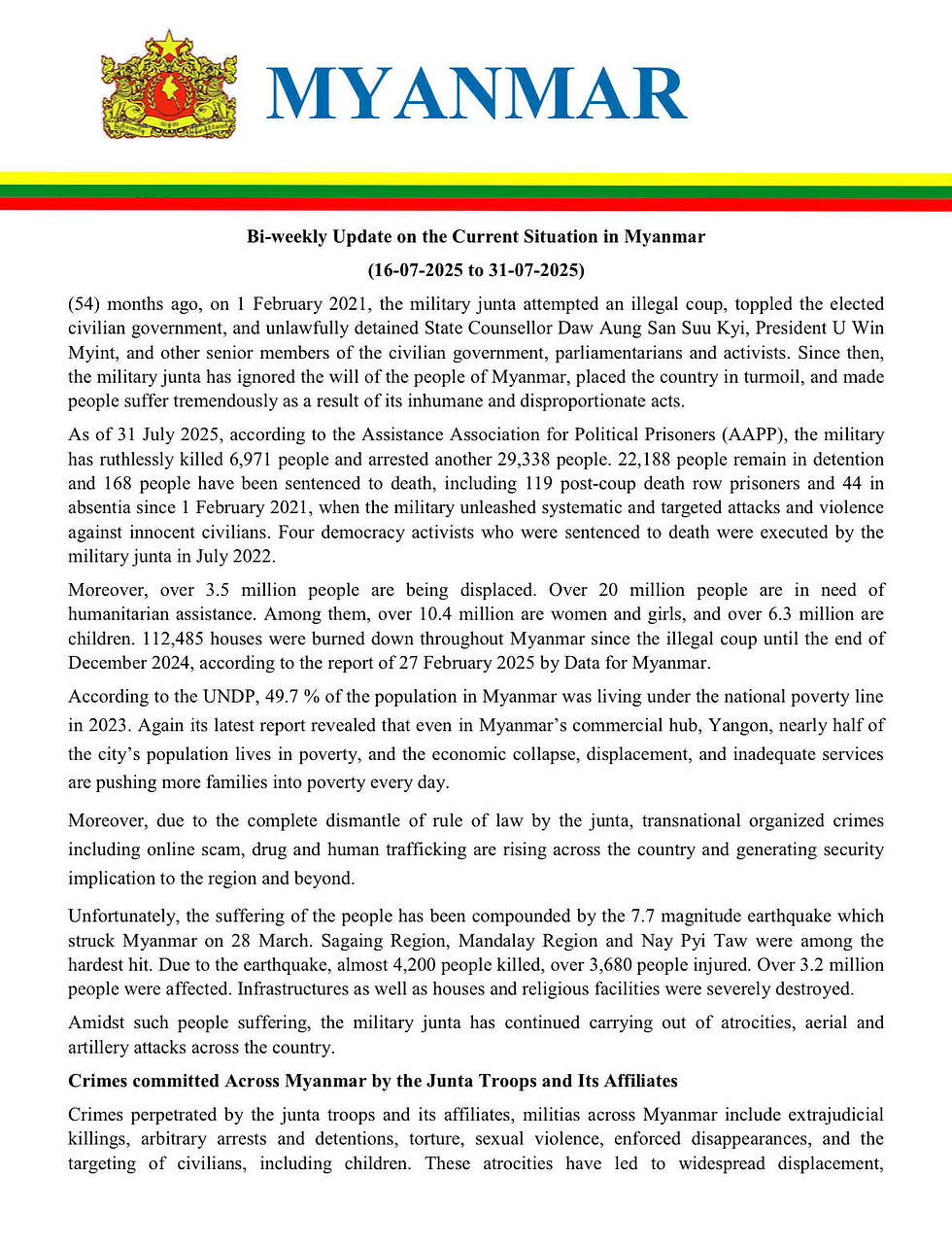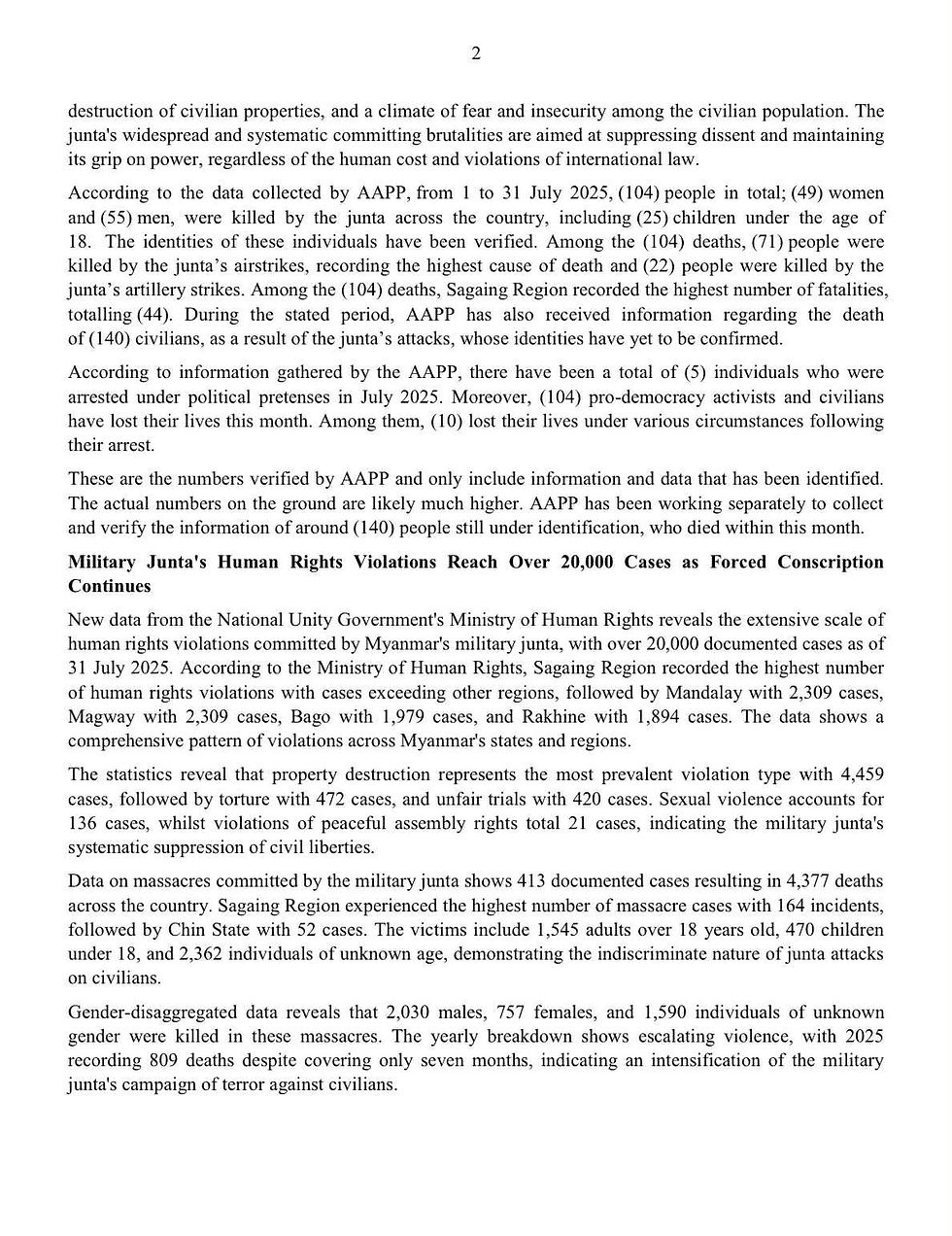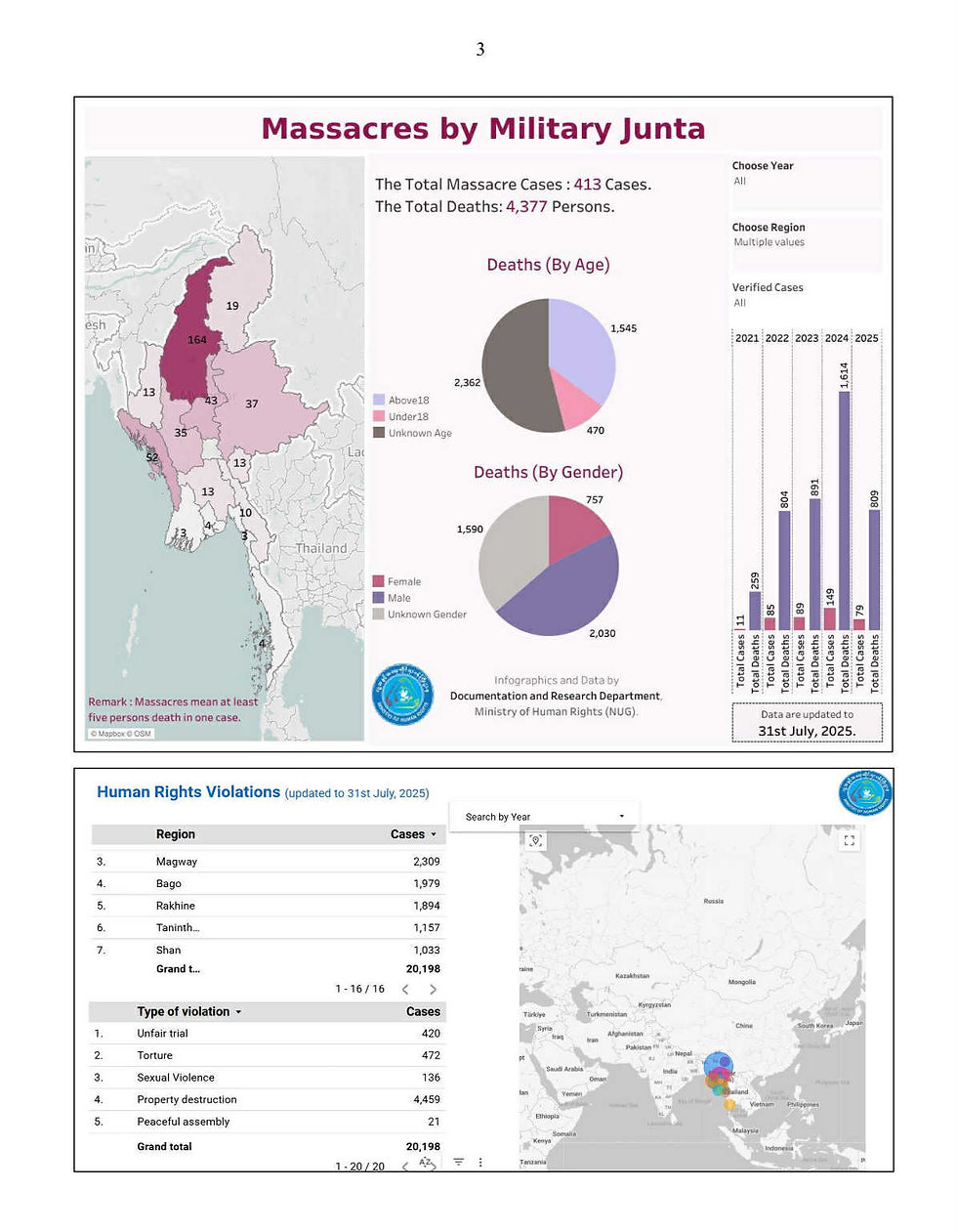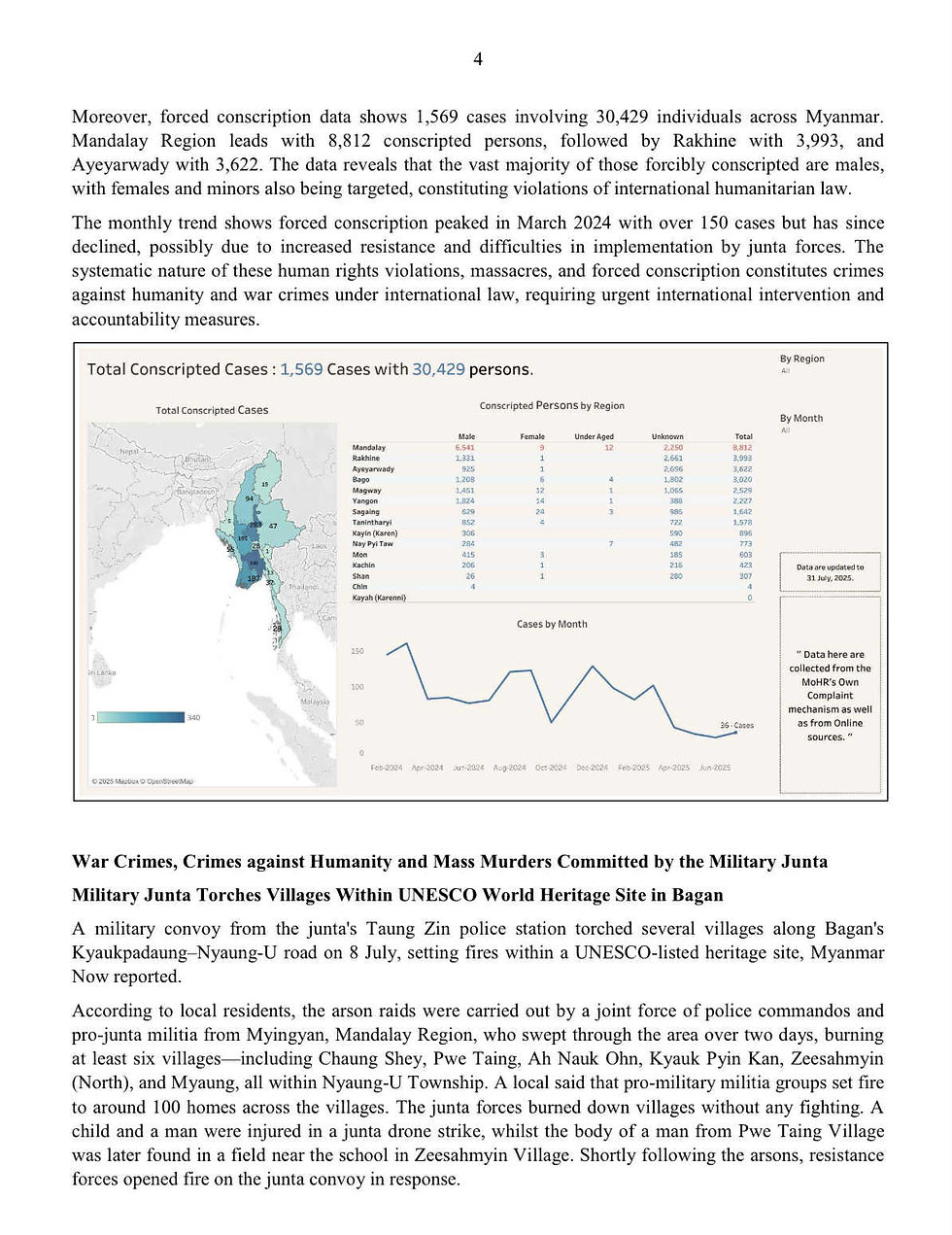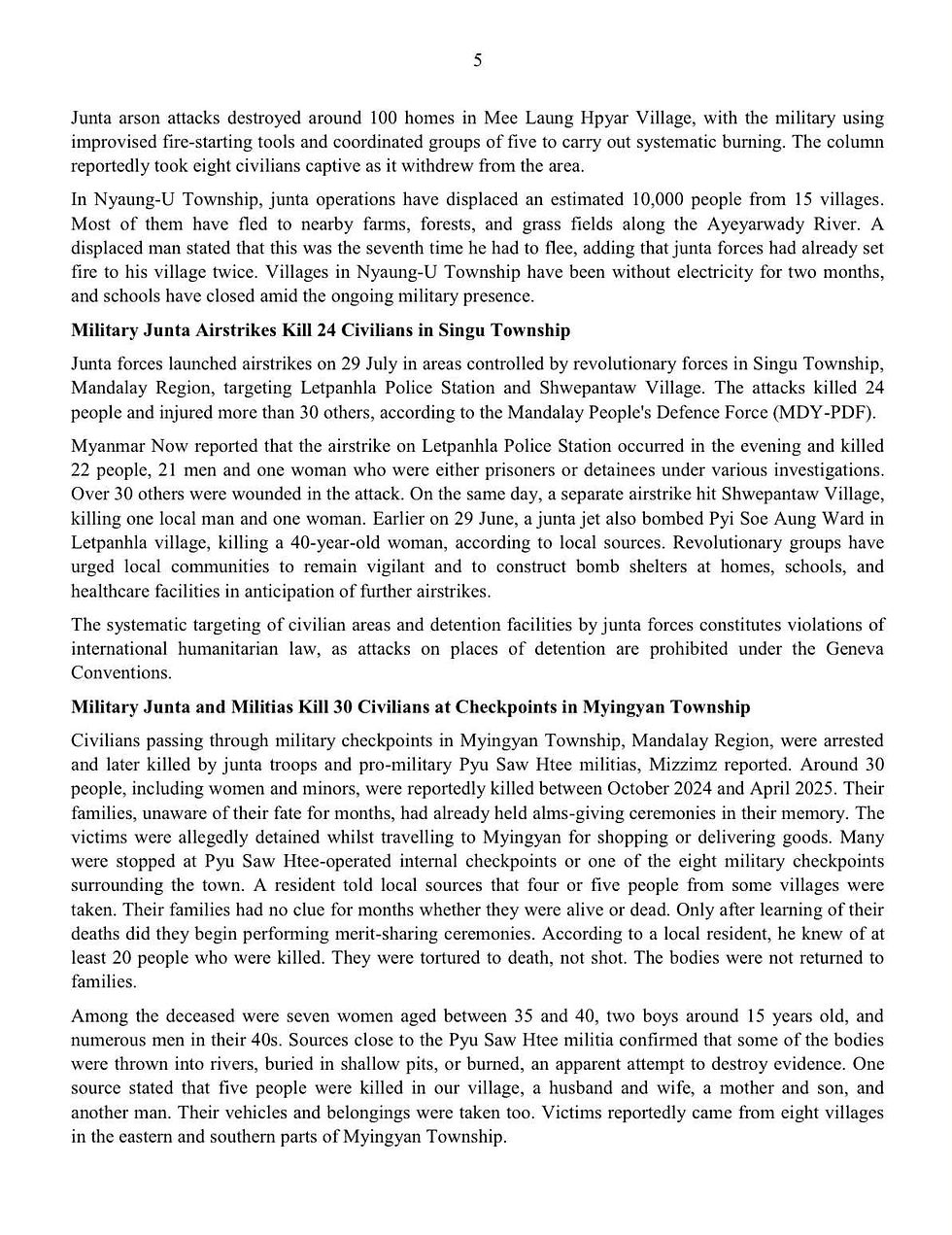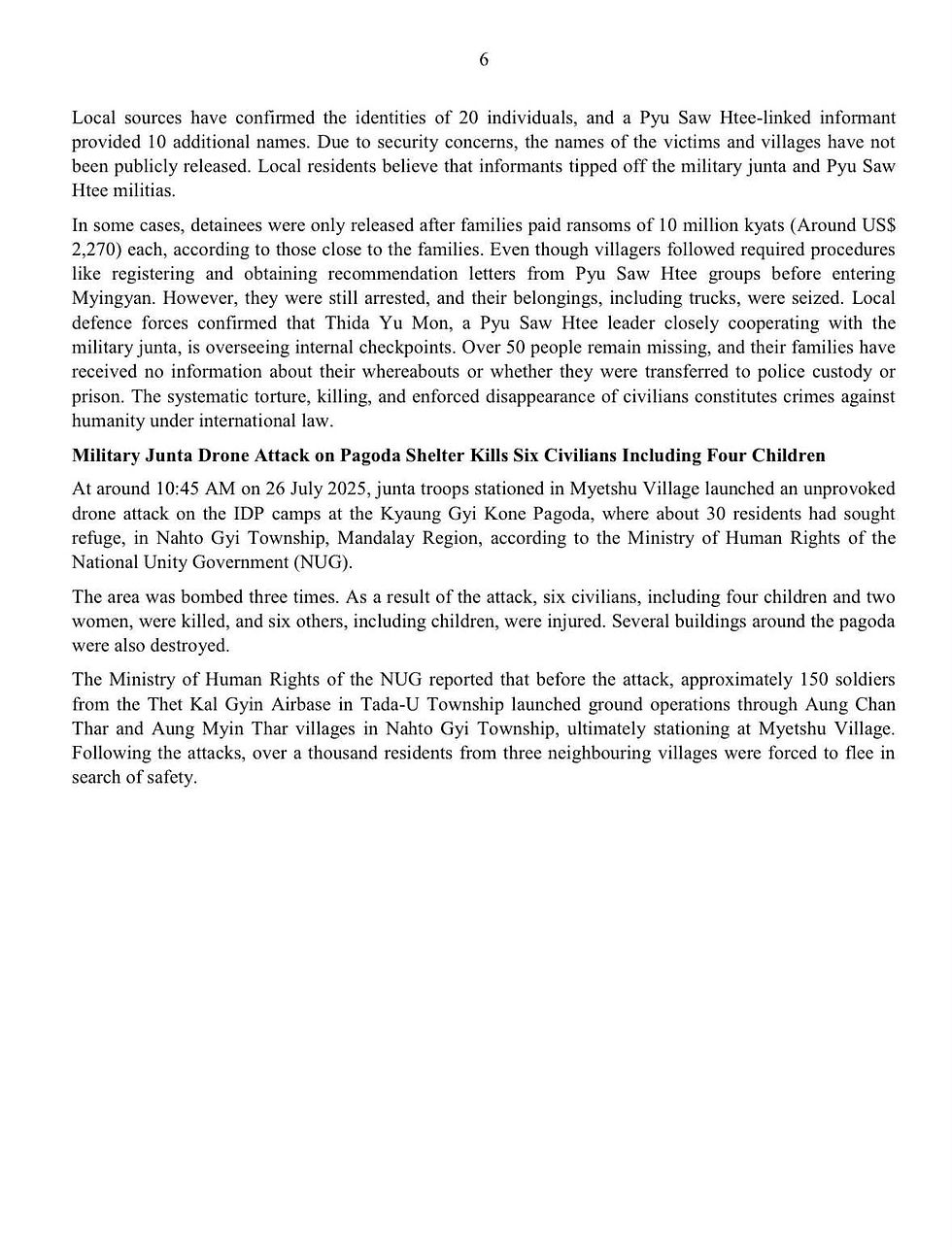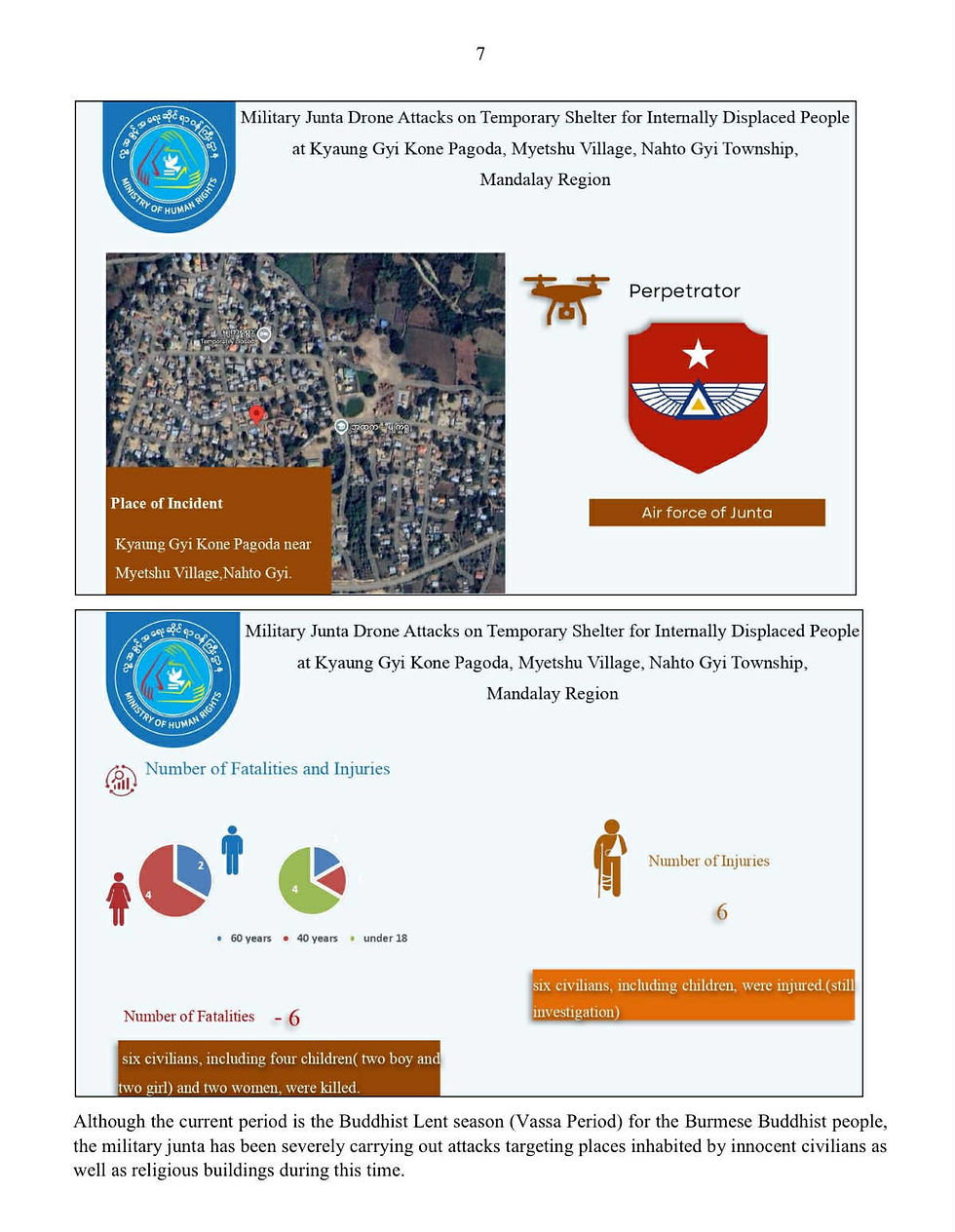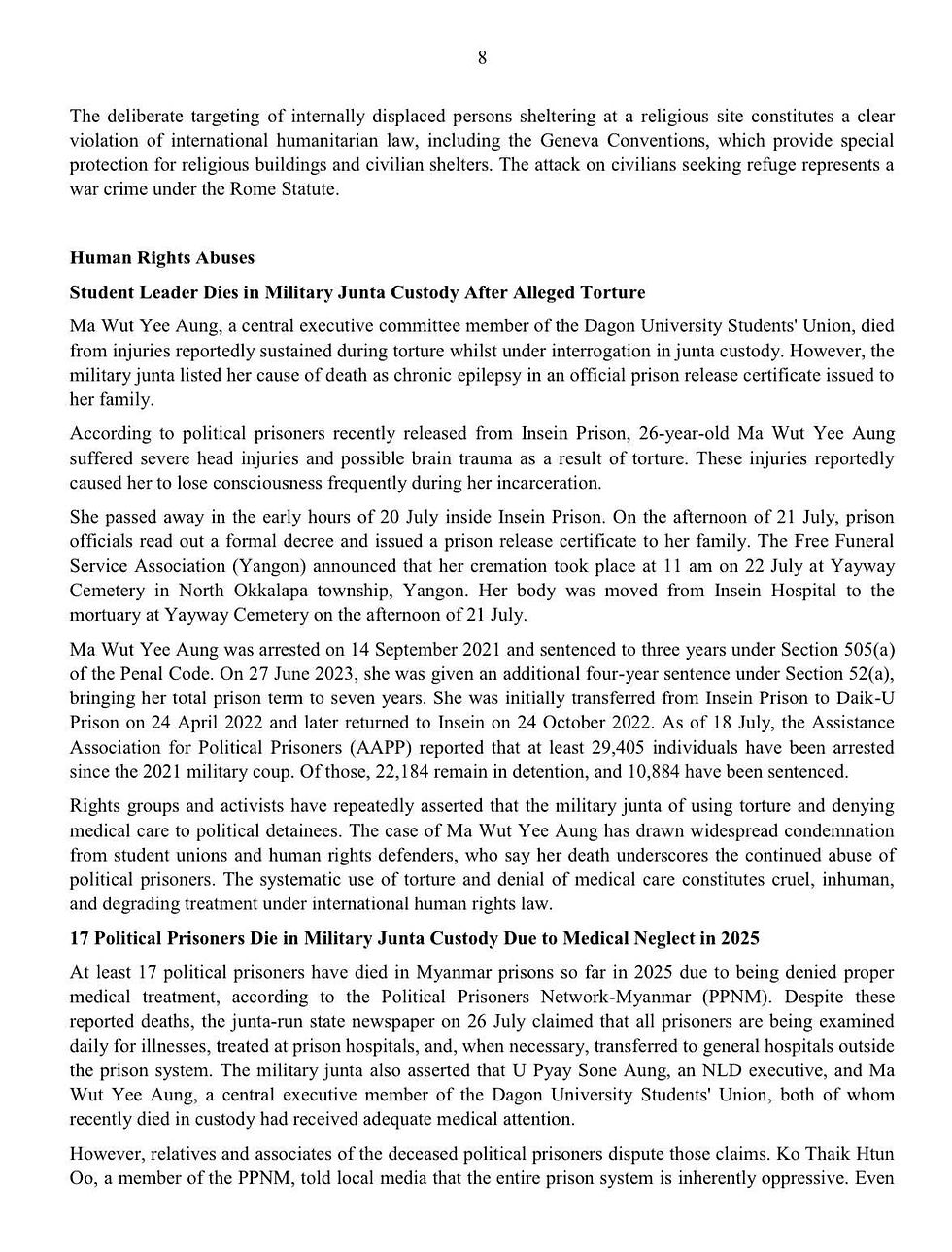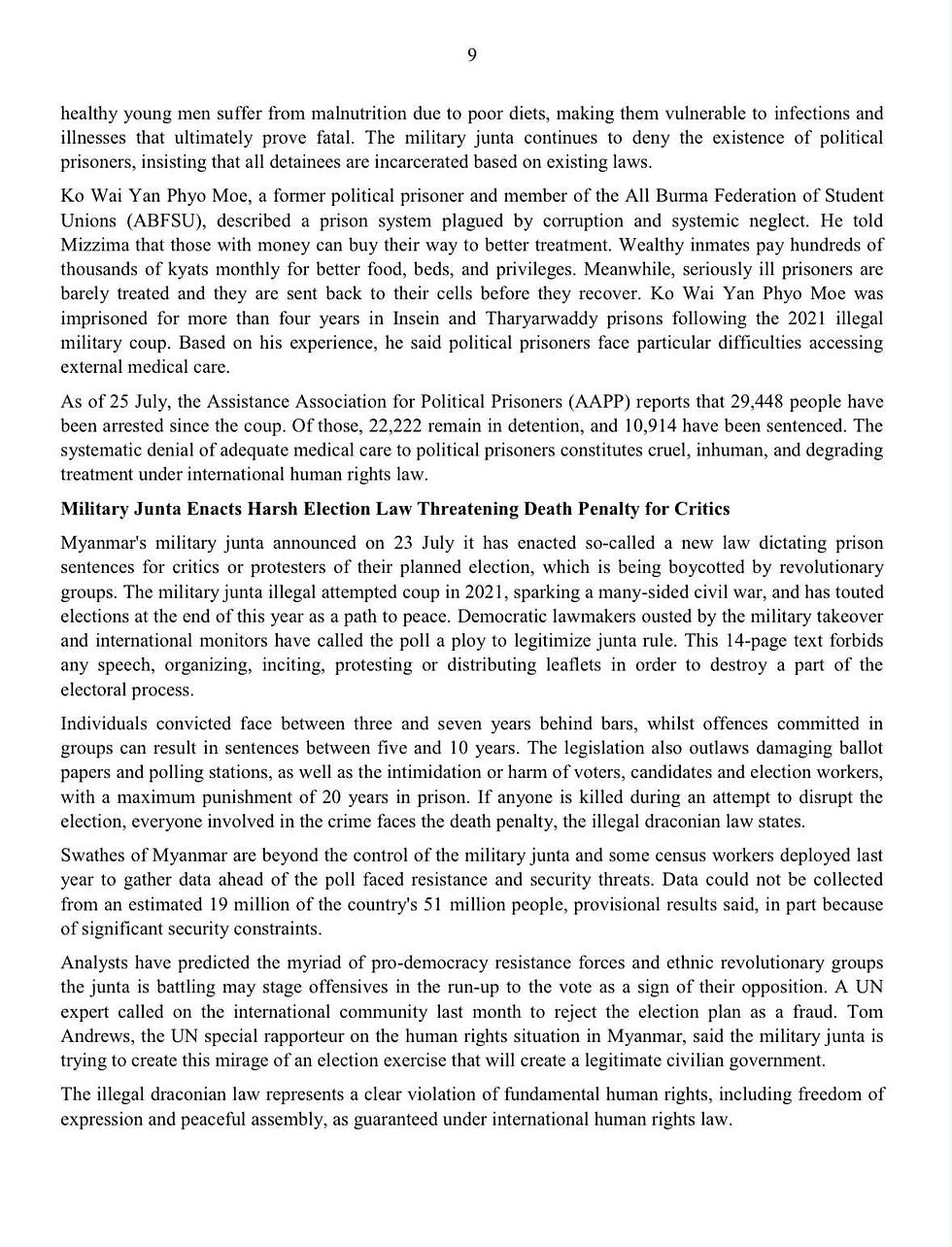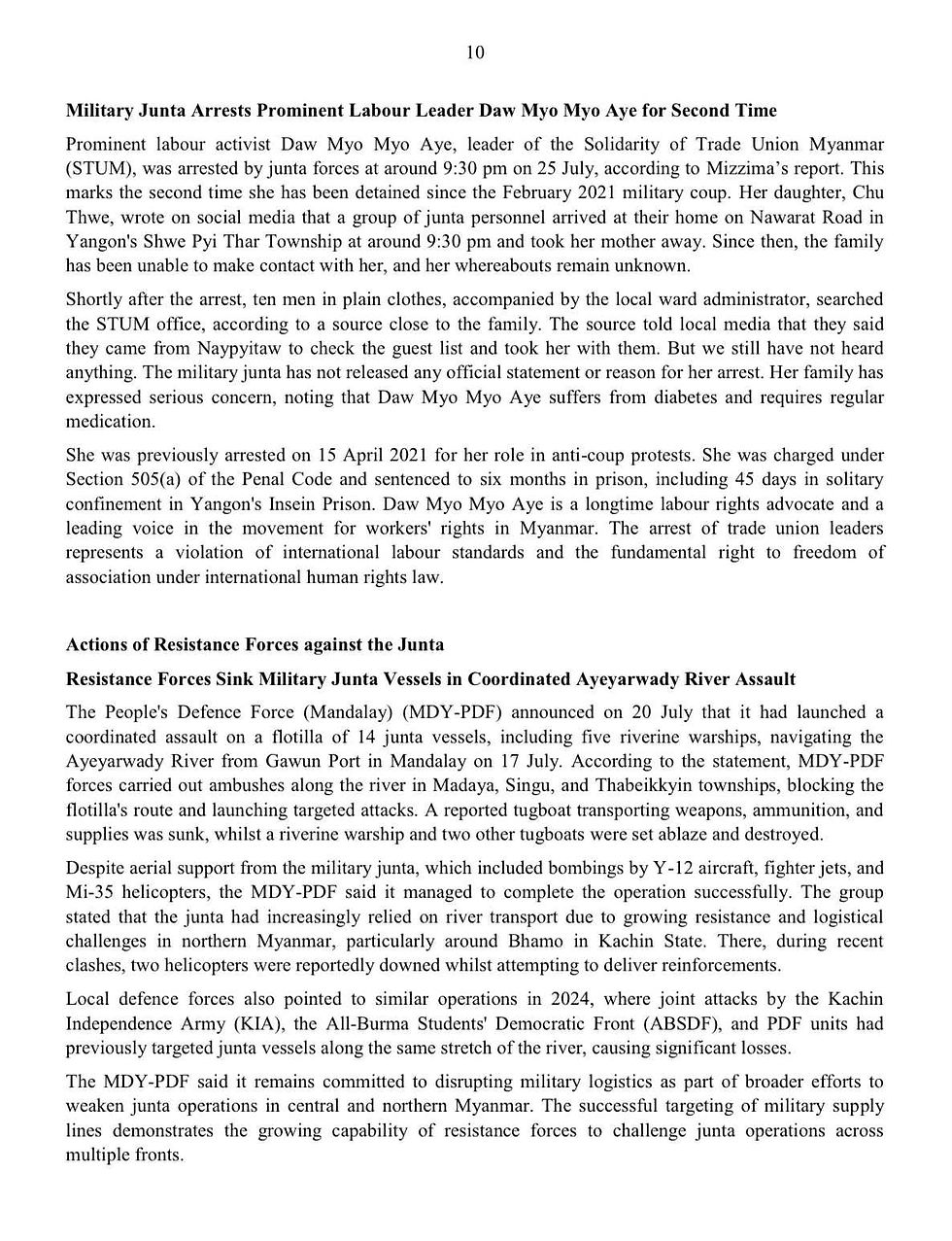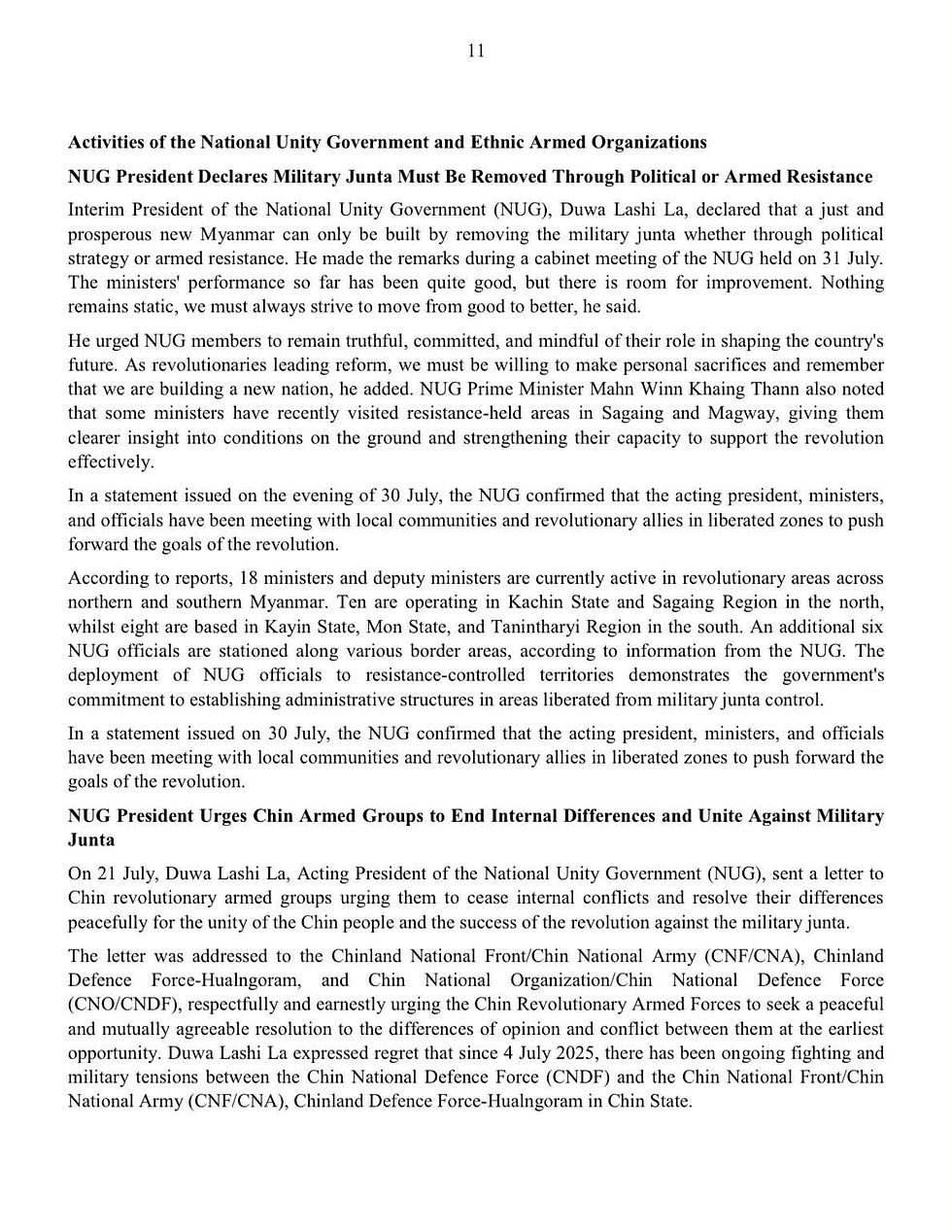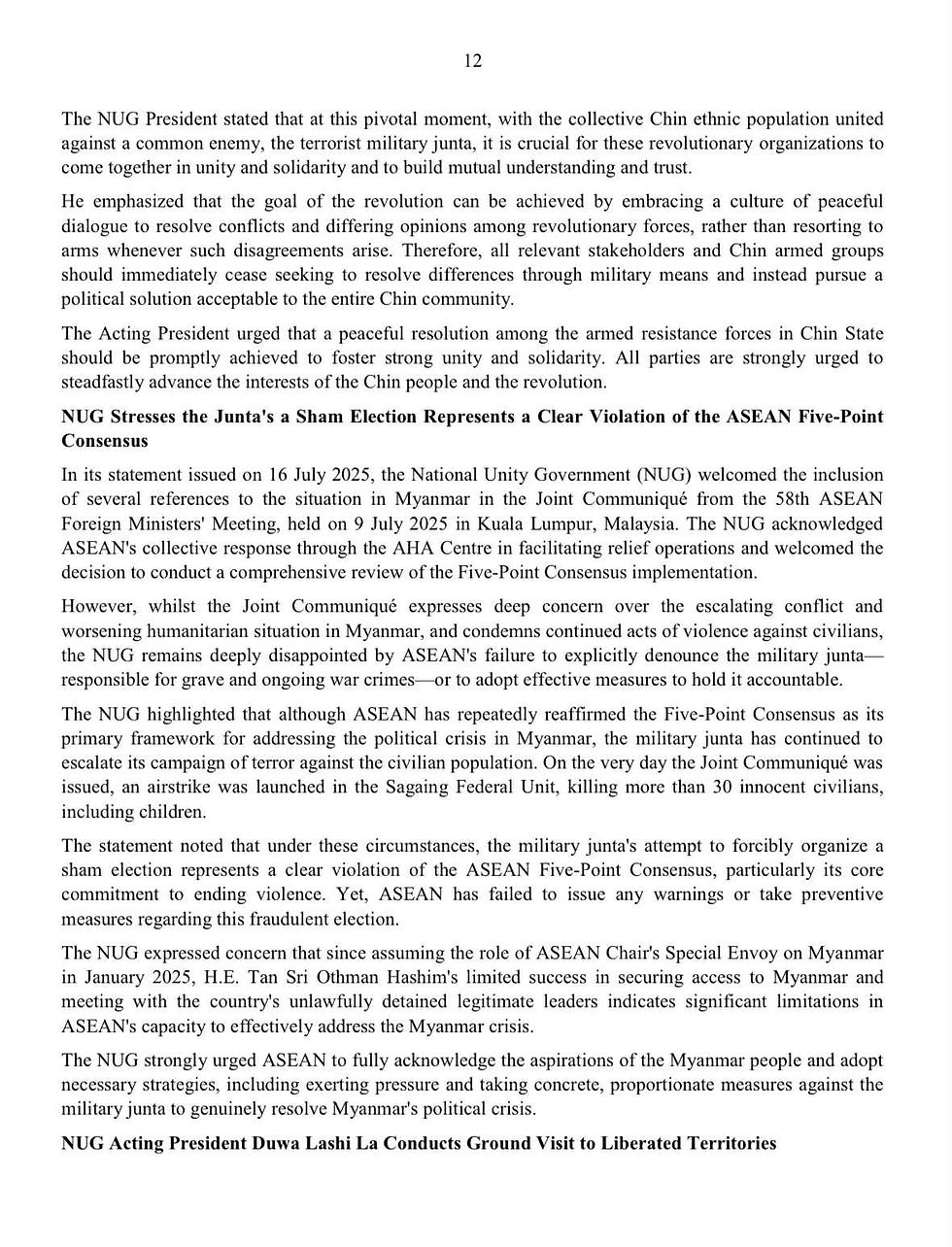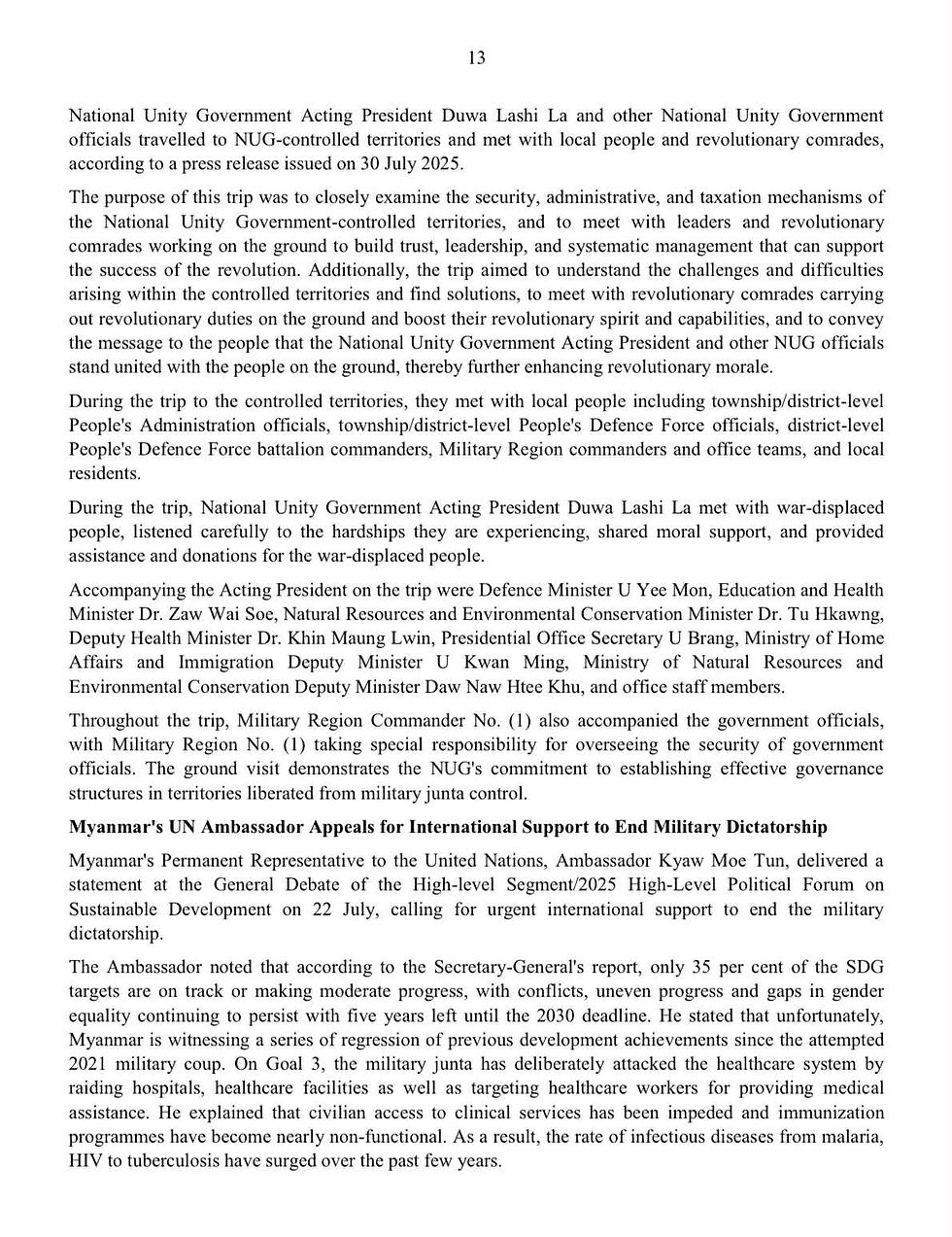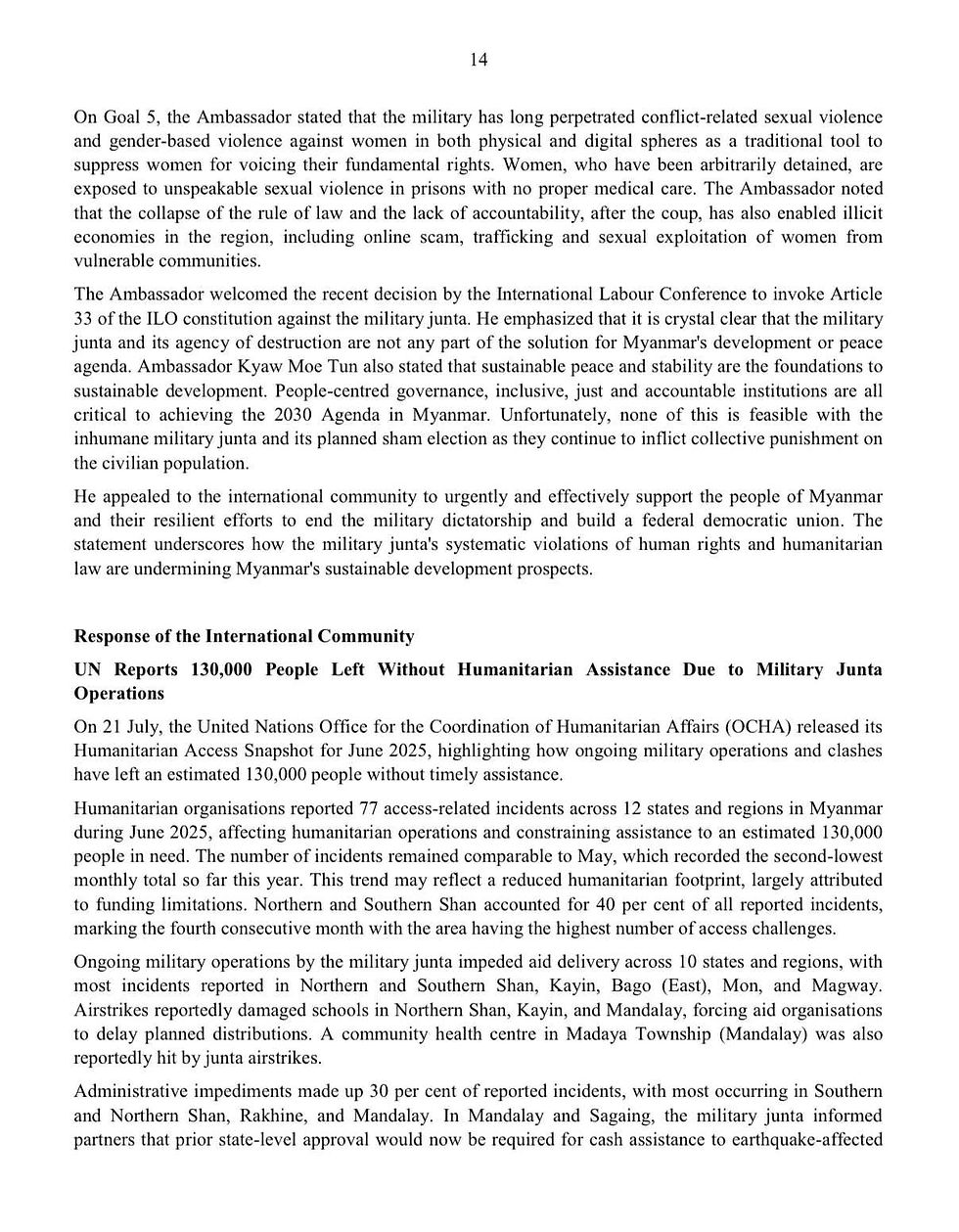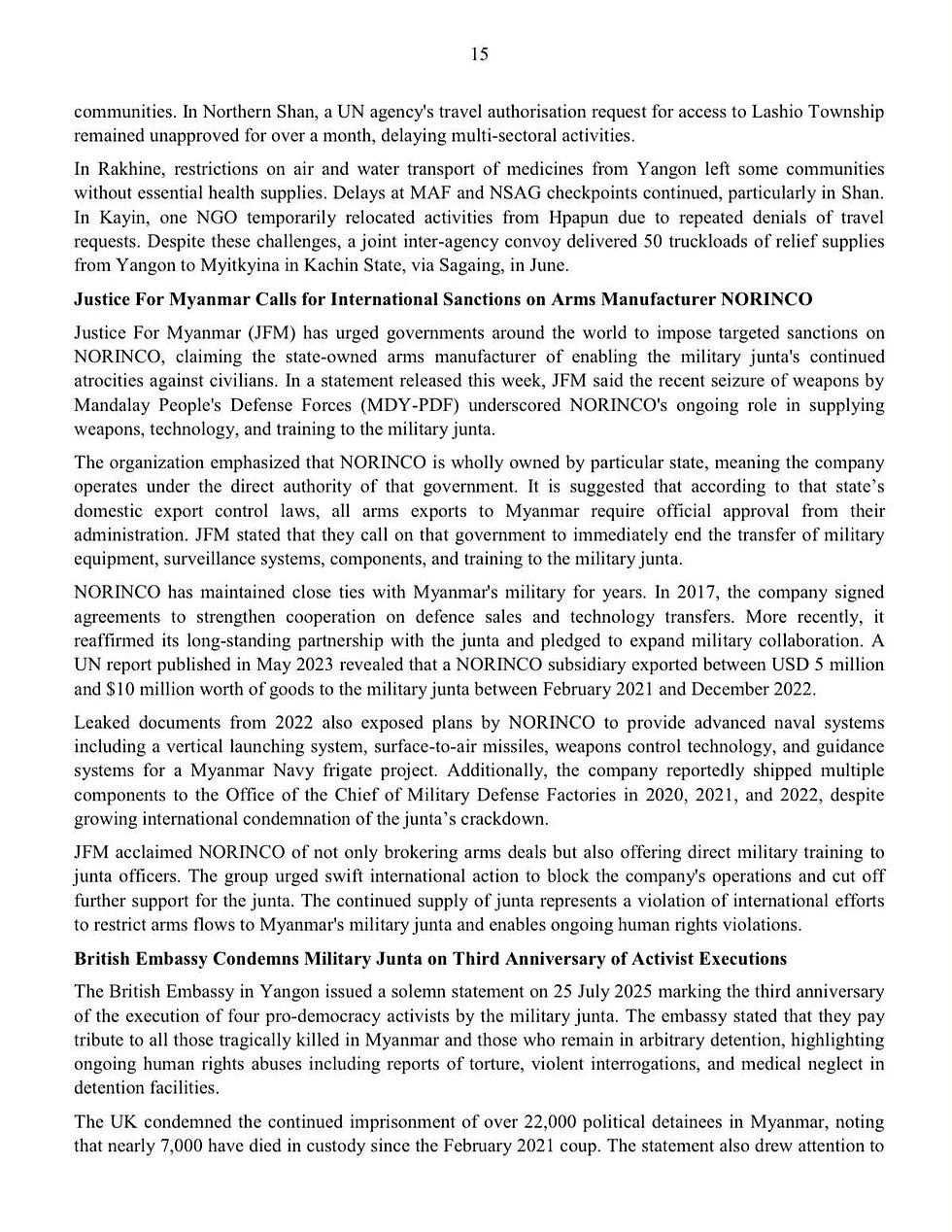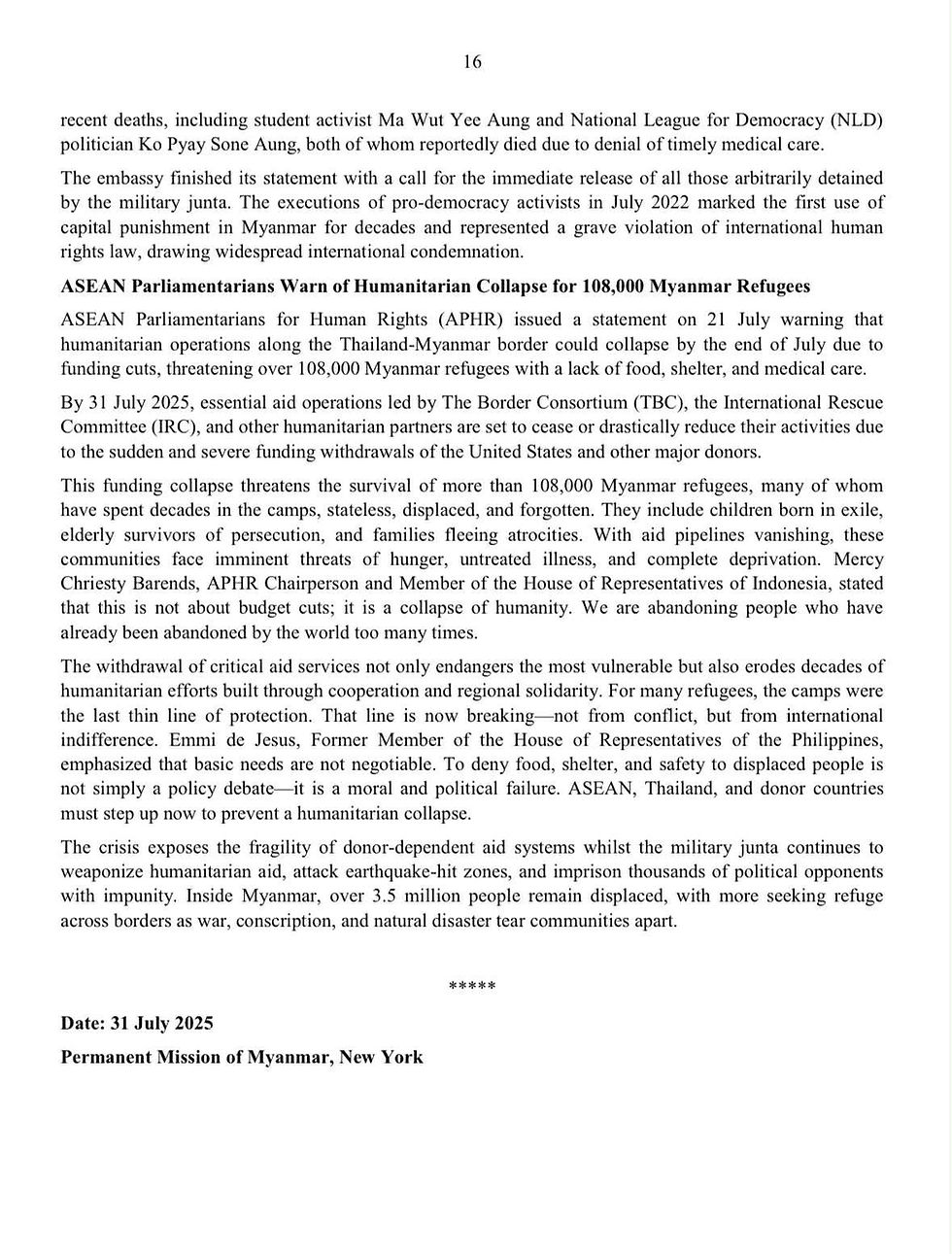Bi-weekly Update on the Current Situation in Myanmar (16-07-2025 to 31-07-2025)
- Myanmar Mission To UN

- Jul 30, 2025
- 26 min read

Bi-weekly Update on the Current Situation in Myanmar
(16-07-2025 to 31-07-2025)
(54) months ago, on 1 February 2021, the military junta attempted an illegal coup, toppled the elected civilian government, and unlawfully detained State Counsellor Daw Aung San Suu Kyi, President U Win Myint, and other senior members of the civilian government, parliamentarians and activists. Since then, the military junta has ignored the will of the people of Myanmar, placed the country in turmoil, and made people suffer tremendously as a result of its inhumane and disproportionate acts.
As of 31 July 2025, according to the Assistance Association for Political Prisoners (AAPP), the military has ruthlessly killed 6,971 people and arrested another 29,338 people. 22,188 people remain in detention and 168 people have been sentenced to death, including 119 post-coup death row prisoners and 44 in absentia since 1 February 2021, when the military unleashed systematic and targeted attacks and violence against innocent civilians. Four democracy activists who were sentenced to death were executed by the military junta in July 2022.
Moreover, over 3.5 million people are being displaced. Over 20 million people are in need of humanitarian assistance. Among them, over 10.4 million are women and girls, and over 6.3 million are children. 112,485 houses were burned down throughout Myanmar since the illegal coup until the end of December 2024, according to the report of 27 February 2025 by Data for Myanmar.
According to the UNDP, 49.7 % of the population in Myanmar was living under the national poverty line in 2023. Again its latest report revealed that even in Myanmar’s commercial hub, Yangon, nearly half of the city’s population lives in poverty, and the economic collapse, displacement, and inadequate services are pushing more families into poverty every day.
Moreover, due to the complete dismantle of rule of law by the junta, transnational organized crimes including online scam, drug and human trafficking are rising across the country and generating security implication to the region and beyond.
Unfortunately, the suffering of the people has been compounded by the 7.7 magnitude earthquake which struck Myanmar on 28 March. Sagaing Region, Mandalay Region and Nay Pyi Taw were among the hardest hit. Due to the earthquake, almost 4,200 people killed, over 3,680 people injured. Over 3.2 million people were affected. Infrastructures as well as houses and religious facilities were severely destroyed.
Amidst such people suffering, the military junta has continued carrying out of atrocities, aerial and artillery attacks across the country.
Crimes committed Across Myanmar by the Junta Troops and Its Affiliates
Crimes perpetrated by the junta troops and its affiliates, militias across Myanmar include extrajudicial killings, arbitrary arrests and detentions, torture, sexual violence, enforced disappearances, and the targeting of civilians, including children. These atrocities have led to widespread displacement, destruction of civilian properties, and a climate of fear and insecurity among the civilian population. The junta's widespread and systematic committing brutalities are aimed at suppressing dissent and maintaining its grip on power, regardless of the human cost and violations of international law.
According to the data collected by AAPP, from 1 to 31 July 2025, (104) people in total; (49) women and (55) men, were killed by the junta across the country, including (25) children under the age of 18. The identities of these individuals have been verified. Among the (104) deaths, (71) people were killed by the junta’s airstrikes, recording the highest cause of death and (22) people were killed by the junta’s artillery strikes. Among the (104) deaths, Sagaing Region recorded the highest number of fatalities, totalling (44). During the stated period, AAPP has also received information regarding the death of (140) civilians, as a result of the junta’s attacks, whose identities have yet to be confirmed.
According to information gathered by the AAPP, there have been a total of (5) individuals who were arrested under political pretenses in July 2025. Moreover, (104) pro-democracy activists and civilians have lost their lives this month. Among them, (10) lost their lives under various circumstances following their arrest.
These are the numbers verified by AAPP and only include information and data that has been identified. The actual numbers on the ground are likely much higher. AAPP has been working separately to collect and verify the information of around (140) people still under identification, who died within this month.
Military Junta's Human Rights Violations Reach Over 20,000 Cases as Forced Conscription Continues
New data from the National Unity Government's Ministry of Human Rights reveals the extensive scale of human rights violations committed by Myanmar's military junta, with over 20,000 documented cases as of 31 July 2025. According to the Ministry of Human Rights, Sagaing Region recorded the highest number of human rights violations with cases exceeding other regions, followed by Mandalay with 2,309 cases, Magway with 2,309 cases, Bago with 1,979 cases, and Rakhine with 1,894 cases. The data shows a comprehensive pattern of violations across Myanmar's states and regions.
The statistics reveal that property destruction represents the most prevalent violation type with 4,459 cases, followed by torture with 472 cases, and unfair trials with 420 cases. Sexual violence accounts for 136 cases, whilst violations of peaceful assembly rights total 21 cases, indicating the military junta's systematic suppression of civil liberties.
Data on massacres committed by the military junta shows 413 documented cases resulting in 4,377 deaths across the country. Sagaing Region experienced the highest number of massacre cases with 164 incidents, followed by Chin State with 52 cases. The victims include 1,545 adults over 18 years old, 470 children under 18, and 2,362 individuals of unknown age, demonstrating the indiscriminate nature of junta attacks on civilians.
Gender-disaggregated data reveals that 2,030 males, 757 females, and 1,590 individuals of unknown gender were killed in these massacres. The yearly breakdown shows escalating violence, with 2025 recording 809 deaths despite covering only seven months, indicating an intensification of the military junta's campaign of terror against civilians.
Moreover, forced conscription data shows 1,569 cases involving 30,429 individuals across Myanmar. Mandalay Region leads with 8,812 conscripted persons, followed by Rakhine with 3,993, and Ayeyarwady with 3,622. The data reveals that the vast majority of those forcibly conscripted are males, with females and minors also being targeted, constituting violations of international humanitarian law.
The monthly trend shows forced conscription peaked in March 2024 with over 150 cases but has since declined, possibly due to increased resistance and difficulties in implementation by junta forces. The systematic nature of these human rights violations, massacres, and forced conscription constitutes crimes against humanity and war crimes under international law, requiring urgent international intervention and accountability measures.
War Crimes, Crimes against Humanity and Mass Murders Committed by the Military Junta
Military Junta Torches Villages Within UNESCO World Heritage Site in Bagan
A military convoy from the junta's Taung Zin police station torched several villages along Bagan's Kyaukpadaung–Nyaung-U road on 8 July, setting fires within a UNESCO-listed heritage site, Myanmar Now reported.
According to local residents, the arson raids were carried out by a joint force of police commandos and pro-junta militia from Myingyan, Mandalay Region, who swept through the area over two days, burning at least six villages—including Chaung Shey, Pwe Taing, Ah Nauk Ohn, Kyauk Pyin Kan, Zeesahmyin (North), and Myaung, all within Nyaung-U Township. A local said that pro-military militia groups set fire to around 100 homes across the villages. The junta forces burned down villages without any fighting. A child and a man were injured in a junta drone strike, whilst the body of a man from Pwe Taing Village was later found in a field near the school in Zeesahmyin Village. Shortly following the arsons, resistance forces opened fire on the junta convoy in response.
Junta arson attacks destroyed around 100 homes in Mee Laung Hpyar Village, with the military using improvised fire-starting tools and coordinated groups of five to carry out systematic burning. The column reportedly took eight civilians captive as it withdrew from the area.
In Nyaung-U Township, junta operations have displaced an estimated 10,000 people from 15 villages. Most of them have fled to nearby farms, forests, and grass fields along the Ayeyarwady River. A displaced man stated that this was the seventh time he had to flee, adding that junta forces had already set fire to his village twice. Villages in Nyaung-U Township have been without electricity for two months, and schools have closed amid the ongoing military presence.
Military Junta Airstrikes Kill 24 Civilians in Singu Township
Junta forces launched airstrikes on 29 July in areas controlled by revolutionary forces in Singu Township, Mandalay Region, targeting Letpanhla Police Station and Shwepantaw Village. The attacks killed 24 people and injured more than 30 others, according to the Mandalay People's Defence Force (MDY-PDF).
Myanmar Now reported that the airstrike on Letpanhla Police Station occurred in the evening and killed 22 people, 21 men and one woman who were either prisoners or detainees under various investigations. Over 30 others were wounded in the attack. On the same day, a separate airstrike hit Shwepantaw Village, killing one local man and one woman. Earlier on 29 June, a junta jet also bombed Pyi Soe Aung Ward in Letpanhla village, killing a 40-year-old woman, according to local sources. Revolutionary groups have urged local communities to remain vigilant and to construct bomb shelters at homes, schools, and healthcare facilities in anticipation of further airstrikes.
The systematic targeting of civilian areas and detention facilities by junta forces constitutes violations of international humanitarian law, as attacks on places of detention are prohibited under the Geneva Conventions.
Military Junta and Militias Kill 30 Civilians at Checkpoints in Myingyan Township
Civilians passing through military checkpoints in Myingyan Township, Mandalay Region, were arrested and later killed by junta troops and pro-military Pyu Saw Htee militias, Mizzimz reported. Around 30 people, including women and minors, were reportedly killed between October 2024 and April 2025. Their families, unaware of their fate for months, had already held alms-giving ceremonies in their memory. The victims were allegedly detained whilst travelling to Myingyan for shopping or delivering goods. Many were stopped at Pyu Saw Htee-operated internal checkpoints or one of the eight military checkpoints surrounding the town. A resident told local sources that four or five people from some villages were taken. Their families had no clue for months whether they were alive or dead. Only after learning of their deaths did they begin performing merit-sharing ceremonies. According to a local resident, he knew of at least 20 people who were killed. They were tortured to death, not shot. The bodies were not returned to families.
Among the deceased were seven women aged between 35 and 40, two boys around 15 years old, and numerous men in their 40s. Sources close to the Pyu Saw Htee militia confirmed that some of the bodies were thrown into rivers, buried in shallow pits, or burned, an apparent attempt to destroy evidence. One source stated that five people were killed in our village, a husband and wife, a mother and son, and another man. Their vehicles and belongings were taken too. Victims reportedly came from eight villages in the eastern and southern parts of Myingyan Township.
Local sources have confirmed the identities of 20 individuals, and a Pyu Saw Htee-linked informant provided 10 additional names. Due to security concerns, the names of the victims and villages have not been publicly released. Local residents believe that informants tipped off the military junta and Pyu Saw Htee militias.
In some cases, detainees were only released after families paid ransoms of 10 million kyats (Around US$ 2,270) each, according to those close to the families. Even though villagers followed required procedures like registering and obtaining recommendation letters from Pyu Saw Htee groups before entering Myingyan. However, they were still arrested, and their belongings, including trucks, were seized. Local defence forces confirmed that Thida Yu Mon, a Pyu Saw Htee leader closely cooperating with the military junta, is overseeing internal checkpoints. Over 50 people remain missing, and their families have received no information about their whereabouts or whether they were transferred to police custody or prison. The systematic torture, killing, and enforced disappearance of civilians constitutes crimes against humanity under international law.
Military Junta Drone Attack on Pagoda Shelter Kills Six Civilians Including Four Children
At around 10:45 AM on 26 July 2025, junta troops stationed in Myetshu Village launched an unprovoked drone attack on the IDP camps at the Kyaung Gyi Kone Pagoda, where about 30 residents had sought refuge, in Nahto Gyi Township, Mandalay Region, according to the Ministry of Human Rights of the National Unity Government (NUG).
The area was bombed three times. As a result of the attack, six civilians, including four children and two women, were killed, and six others, including children, were injured. Several buildings around the pagoda were also destroyed.
The Ministry of Human Rights of the NUG reported that before the attack, approximately 150 soldiers from the Thet Kal Gyin Airbase in Tada-U Township launched ground operations through Aung Chan Thar and Aung Myin Thar villages in Nahto Gyi Township, ultimately stationing at Myetshu Village. Following the attacks, over a thousand residents from three neighbouring villages were forced to flee in search of safety.
Although the current period is the Buddhist Lent season (Vassa Period) for the Burmese Buddhist people, the military junta has been severely carrying out attacks targeting places inhabited by innocent civilians as well as religious buildings during this time.
The deliberate targeting of internally displaced persons sheltering at a religious site constitutes a clear violation of international humanitarian law, including the Geneva Conventions, which provide special protection for religious buildings and civilian shelters. The attack on civilians seeking refuge represents a war crime under the Rome Statute.
Human Rights Abuses
Student Leader Dies in Military Junta Custody After Alleged Torture
Ma Wut Yee Aung, a central executive committee member of the Dagon University Students' Union, died from injuries reportedly sustained during torture whilst under interrogation in junta custody. However, the military junta listed her cause of death as chronic epilepsy in an official prison release certificate issued to her family.
According to political prisoners recently released from Insein Prison, 26-year-old Ma Wut Yee Aung suffered severe head injuries and possible brain trauma as a result of torture. These injuries reportedly caused her to lose consciousness frequently during her incarceration.
She passed away in the early hours of 20 July inside Insein Prison. On the afternoon of 21 July, prison officials read out a formal decree and issued a prison release certificate to her family. The Free Funeral Service Association (Yangon) announced that her cremation took place at 11 am on 22 July at Yayway Cemetery in North Okkalapa township, Yangon. Her body was moved from Insein Hospital to the mortuary at Yayway Cemetery on the afternoon of 21 July.
Ma Wut Yee Aung was arrested on 14 September 2021 and sentenced to three years under Section 505(a) of the Penal Code. On 27 June 2023, she was given an additional four-year sentence under Section 52(a), bringing her total prison term to seven years. She was initially transferred from Insein Prison to Daik-U Prison on 24 April 2022 and later returned to Insein on 24 October 2022. As of 18 July, the Assistance Association for Political Prisoners (AAPP) reported that at least 29,405 individuals have been arrested since the 2021 military coup. Of those, 22,184 remain in detention, and 10,884 have been sentenced.
Rights groups and activists have repeatedly asserted that the military junta of using torture and denying medical care to political detainees. The case of Ma Wut Yee Aung has drawn widespread condemnation from student unions and human rights defenders, who say her death underscores the continued abuse of political prisoners. The systematic use of torture and denial of medical care constitutes cruel, inhuman, and degrading treatment under international human rights law.
17 Political Prisoners Die in Military Junta Custody Due to Medical Neglect in 2025
At least 17 political prisoners have died in Myanmar prisons so far in 2025 due to being denied proper medical treatment, according to the Political Prisoners Network-Myanmar (PPNM). Despite these reported deaths, the junta-run state newspaper on 26 July claimed that all prisoners are being examined daily for illnesses, treated at prison hospitals, and, when necessary, transferred to general hospitals outside the prison system. The military junta also asserted that U Pyay Sone Aung, an NLD executive, and Ma Wut Yee Aung, a central executive member of the Dagon University Students' Union, both of whom recently died in custody had received adequate medical attention.
However, relatives and associates of the deceased political prisoners dispute those claims. Ko Thaik Htun Oo, a member of the PPNM, told local media that the entire prison system is inherently oppressive. Even healthy young men suffer from malnutrition due to poor diets, making them vulnerable to infections and illnesses that ultimately prove fatal. The military junta continues to deny the existence of political prisoners, insisting that all detainees are incarcerated based on existing laws.
Ko Wai Yan Phyo Moe, a former political prisoner and member of the All Burma Federation of Student Unions (ABFSU), described a prison system plagued by corruption and systemic neglect. He told Mizzima that those with money can buy their way to better treatment. Wealthy inmates pay hundreds of thousands of kyats monthly for better food, beds, and privileges. Meanwhile, seriously ill prisoners are barely treated and they are sent back to their cells before they recover. Ko Wai Yan Phyo Moe was imprisoned for more than four years in Insein and Tharyarwaddy prisons following the 2021 illegal military coup. Based on his experience, he said political prisoners face particular difficulties accessing external medical care.
As of 25 July, the Assistance Association for Political Prisoners (AAPP) reports that 29,448 people have been arrested since the coup. Of those, 22,222 remain in detention, and 10,914 have been sentenced. The systematic denial of adequate medical care to political prisoners constitutes cruel, inhuman, and degrading treatment under international human rights law.
Military Junta Enacts Harsh Election Law Threatening Death Penalty for Critics
Myanmar's military junta announced on 23 July it has enacted so-called a new law dictating prison sentences for critics or protesters of their planned election, which is being boycotted by revolutionary groups. The military junta illegal attempted coup in 2021, sparking a many-sided civil war, and has touted elections at the end of this year as a path to peace. Democratic lawmakers ousted by the military takeover and international monitors have called the poll a ploy to legitimize junta rule. This 14-page text forbids any speech, organizing, inciting, protesting or distributing leaflets in order to destroy a part of the electoral process.
Individuals convicted face between three and seven years behind bars, whilst offences committed in groups can result in sentences between five and 10 years. The legislation also outlaws damaging ballot papers and polling stations, as well as the intimidation or harm of voters, candidates and election workers, with a maximum punishment of 20 years in prison. If anyone is killed during an attempt to disrupt the election, everyone involved in the crime faces the death penalty, the illegal draconian law states.
Swathes of Myanmar are beyond the control of the military junta and some census workers deployed last year to gather data ahead of the poll faced resistance and security threats. Data could not be collected from an estimated 19 million of the country's 51 million people, provisional results said, in part because of significant security constraints.
Analysts have predicted the myriad of pro-democracy resistance forces and ethnic revolutionary groups the junta is battling may stage offensives in the run-up to the vote as a sign of their opposition. A UN expert called on the international community last month to reject the election plan as a fraud. Tom Andrews, the UN special rapporteur on the human rights situation in Myanmar, said the military junta is trying to create this mirage of an election exercise that will create a legitimate civilian government.
The illegal draconian law represents a clear violation of fundamental human rights, including freedom of expression and peaceful assembly, as guaranteed under international human rights law.
Military Junta Arrests Prominent Labour Leader Daw Myo Myo Aye for Second Time
Prominent labour activist Daw Myo Myo Aye, leader of the Solidarity of Trade Union Myanmar (STUM), was arrested by junta forces at around 9:30 pm on 25 July, according to Mizzima’s report. This marks the second time she has been detained since the February 2021 military coup. Her daughter, Chu Thwe, wrote on social media that a group of junta personnel arrived at their home on Nawarat Road in Yangon's Shwe Pyi Thar Township at around 9:30 pm and took her mother away. Since then, the family has been unable to make contact with her, and her whereabouts remain unknown.
Shortly after the arrest, ten men in plain clothes, accompanied by the local ward administrator, searched the STUM office, according to a source close to the family. The source told local media that they said they came from Naypyitaw to check the guest list and took her with them. But we still have not heard anything. The military junta has not released any official statement or reason for her arrest. Her family has expressed serious concern, noting that Daw Myo Myo Aye suffers from diabetes and requires regular medication.
She was previously arrested on 15 April 2021 for her role in anti-coup protests. She was charged under Section 505(a) of the Penal Code and sentenced to six months in prison, including 45 days in solitary confinement in Yangon's Insein Prison. Daw Myo Myo Aye is a longtime labour rights advocate and a leading voice in the movement for workers' rights in Myanmar. The arrest of trade union leaders represents a violation of international labour standards and the fundamental right to freedom of association under international human rights law.
Actions of Resistance Forces against the Junta
Resistance Forces Sink Military Junta Vessels in Coordinated Ayeyarwady River Assault
The People's Defence Force (Mandalay) (MDY-PDF) announced on 20 July that it had launched a coordinated assault on a flotilla of 14 junta vessels, including five riverine warships, navigating the Ayeyarwady River from Gawun Port in Mandalay on 17 July. According to the statement, MDY-PDF forces carried out ambushes along the river in Madaya, Singu, and Thabeikkyin townships, blocking the flotilla's route and launching targeted attacks. A reported tugboat transporting weapons, ammunition, and supplies was sunk, whilst a riverine warship and two other tugboats were set ablaze and destroyed.
Despite aerial support from the military junta, which included bombings by Y-12 aircraft, fighter jets, and Mi-35 helicopters, the MDY-PDF said it managed to complete the operation successfully. The group stated that the junta had increasingly relied on river transport due to growing resistance and logistical challenges in northern Myanmar, particularly around Bhamo in Kachin State. There, during recent clashes, two helicopters were reportedly downed whilst attempting to deliver reinforcements.
Local defence forces also pointed to similar operations in 2024, where joint attacks by the Kachin Independence Army (KIA), the All-Burma Students' Democratic Front (ABSDF), and PDF units had previously targeted junta vessels along the same stretch of the river, causing significant losses.
The MDY-PDF said it remains committed to disrupting military logistics as part of broader efforts to weaken junta operations in central and northern Myanmar. The successful targeting of military supply lines demonstrates the growing capability of resistance forces to challenge junta operations across multiple fronts.
Activities of the National Unity Government and Ethnic Armed Organizations
NUG President Declares Military Junta Must Be Removed Through Political or Armed Resistance
Interim President of the National Unity Government (NUG), Duwa Lashi La, declared that a just and prosperous new Myanmar can only be built by removing the military junta whether through political strategy or armed resistance. He made the remarks during a cabinet meeting of the NUG held on 31 July. The ministers' performance so far has been quite good, but there is room for improvement. Nothing remains static, we must always strive to move from good to better, he said.
He urged NUG members to remain truthful, committed, and mindful of their role in shaping the country's future. As revolutionaries leading reform, we must be willing to make personal sacrifices and remember that we are building a new nation, he added. NUG Prime Minister Mahn Winn Khaing Thann also noted that some ministers have recently visited resistance-held areas in Sagaing and Magway, giving them clearer insight into conditions on the ground and strengthening their capacity to support the revolution effectively.
In a statement issued on the evening of 30 July, the NUG confirmed that the acting president, ministers, and officials have been meeting with local communities and revolutionary allies in liberated zones to push forward the goals of the revolution.
According to reports, 18 ministers and deputy ministers are currently active in revolutionary areas across northern and southern Myanmar. Ten are operating in Kachin State and Sagaing Region in the north, whilst eight are based in Kayin State, Mon State, and Tanintharyi Region in the south. An additional six NUG officials are stationed along various border areas, according to information from the NUG. The deployment of NUG officials to resistance-controlled territories demonstrates the government's commitment to establishing administrative structures in areas liberated from military junta control.
In a statement issued on 30 July, the NUG confirmed that the acting president, ministers, and officials have been meeting with local communities and revolutionary allies in liberated zones to push forward the goals of the revolution.
NUG President Urges Chin Armed Groups to End Internal Differences and Unite Against Military Junta
On 21 July, Duwa Lashi La, Acting President of the National Unity Government (NUG), sent a letter to Chin revolutionary armed groups urging them to cease internal conflicts and resolve their differences peacefully for the unity of the Chin people and the success of the revolution against the military junta.
The letter was addressed to the Chinland National Front/Chin National Army (CNF/CNA), Chinland Defence Force-Hualngoram, and Chin National Organization/Chin National Defence Force (CNO/CNDF), respectfully and earnestly urging the Chin Revolutionary Armed Forces to seek a peaceful and mutually agreeable resolution to the differences of opinion and conflict between them at the earliest opportunity. Duwa Lashi La expressed regret that since 4 July 2025, there has been ongoing fighting and military tensions between the Chin National Defence Force (CNDF) and the Chin National Front/Chin National Army (CNF/CNA), Chinland Defence Force-Hualngoram in Chin State.
The NUG President stated that at this pivotal moment, with the collective Chin ethnic population united against a common enemy, the terrorist military junta, it is crucial for these revolutionary organizations to come together in unity and solidarity and to build mutual understanding and trust.
He emphasized that the goal of the revolution can be achieved by embracing a culture of peaceful dialogue to resolve conflicts and differing opinions among revolutionary forces, rather than resorting to arms whenever such disagreements arise. Therefore, all relevant stakeholders and Chin armed groups should immediately cease seeking to resolve differences through military means and instead pursue a political solution acceptable to the entire Chin community.
The Acting President urged that a peaceful resolution among the armed resistance forces in Chin State should be promptly achieved to foster strong unity and solidarity. All parties are strongly urged to steadfastly advance the interests of the Chin people and the revolution.
NUG Stresses the Junta's a Sham Election Represents a Clear Violation of the ASEAN Five-Point Consensus
In its statement issued on 16 July 2025, the National Unity Government (NUG) welcomed the inclusion of several references to the situation in Myanmar in the Joint Communiqué from the 58th ASEAN Foreign Ministers' Meeting, held on 9 July 2025 in Kuala Lumpur, Malaysia. The NUG acknowledged ASEAN's collective response through the AHA Centre in facilitating relief operations and welcomed the decision to conduct a comprehensive review of the Five-Point Consensus implementation.
However, whilst the Joint Communiqué expresses deep concern over the escalating conflict and worsening humanitarian situation in Myanmar, and condemns continued acts of violence against civilians, the NUG remains deeply disappointed by ASEAN's failure to explicitly denounce the military junta—responsible for grave and ongoing war crimes—or to adopt effective measures to hold it accountable.
The NUG highlighted that although ASEAN has repeatedly reaffirmed the Five-Point Consensus as its primary framework for addressing the political crisis in Myanmar, the military junta has continued to escalate its campaign of terror against the civilian population. On the very day the Joint Communiqué was issued, an airstrike was launched in the Sagaing Federal Unit, killing more than 30 innocent civilians, including children.
The statement noted that under these circumstances, the military junta's attempt to forcibly organize a sham election represents a clear violation of the ASEAN Five-Point Consensus, particularly its core commitment to ending violence. Yet, ASEAN has failed to issue any warnings or take preventive measures regarding this fraudulent election.
The NUG expressed concern that since assuming the role of ASEAN Chair's Special Envoy on Myanmar in January 2025, H.E. Tan Sri Othman Hashim's limited success in securing access to Myanmar and meeting with the country's unlawfully detained legitimate leaders indicates significant limitations in ASEAN's capacity to effectively address the Myanmar crisis.
The NUG strongly urged ASEAN to fully acknowledge the aspirations of the Myanmar people and adopt necessary strategies, including exerting pressure and taking concrete, proportionate measures against the military junta to genuinely resolve Myanmar's political crisis.
NUG Acting President Duwa Lashi La Conducts Ground Visit to Liberated Territories
National Unity Government Acting President Duwa Lashi La and other National Unity Government officials travelled to NUG-controlled territories and met with local people and revolutionary comrades, according to a press release issued on 30 July 2025.
The purpose of this trip was to closely examine the security, administrative, and taxation mechanisms of the National Unity Government-controlled territories, and to meet with leaders and revolutionary comrades working on the ground to build trust, leadership, and systematic management that can support the success of the revolution. Additionally, the trip aimed to understand the challenges and difficulties arising within the controlled territories and find solutions, to meet with revolutionary comrades carrying out revolutionary duties on the ground and boost their revolutionary spirit and capabilities, and to convey the message to the people that the National Unity Government Acting President and other NUG officials stand united with the people on the ground, thereby further enhancing revolutionary morale.
During the trip to the controlled territories, they met with local people including township/district-level People's Administration officials, township/district-level People's Defence Force officials, district-level People's Defence Force battalion commanders, Military Region commanders and office teams, and local residents.
During the trip, National Unity Government Acting President Duwa Lashi La met with war-displaced people, listened carefully to the hardships they are experiencing, shared moral support, and provided assistance and donations for the war-displaced people.
Accompanying the Acting President on the trip were Defence Minister U Yee Mon, Education and Health Minister Dr. Zaw Wai Soe, Natural Resources and Environmental Conservation Minister Dr. Tu Hkawng, Deputy Health Minister Dr. Khin Maung Lwin, Presidential Office Secretary U Brang, Ministry of Home Affairs and Immigration Deputy Minister U Kwan Ming, Ministry of Natural Resources and Environmental Conservation Deputy Minister Daw Naw Htee Khu, and office staff members.
Throughout the trip, Military Region Commander No. (1) also accompanied the government officials, with Military Region No. (1) taking special responsibility for overseeing the security of government officials. The ground visit demonstrates the NUG's commitment to establishing effective governance structures in territories liberated from military junta control.
Myanmar's UN Ambassador Appeals for International Support to End Military Dictatorship
Myanmar's Permanent Representative to the United Nations, Ambassador Kyaw Moe Tun, delivered a statement at the General Debate of the High-level Segment/2025 High-Level Political Forum on Sustainable Development on 22 July, calling for urgent international support to end the military dictatorship.
The Ambassador noted that according to the Secretary-General's report, only 35 per cent of the SDG targets are on track or making moderate progress, with conflicts, uneven progress and gaps in gender equality continuing to persist with five years left until the 2030 deadline. He stated that unfortunately, Myanmar is witnessing a series of regression of previous development achievements since the attempted 2021 military coup. On Goal 3, the military junta has deliberately attacked the healthcare system by raiding hospitals, healthcare facilities as well as targeting healthcare workers for providing medical assistance. He explained that civilian access to clinical services has been impeded and immunization programmes have become nearly non-functional. As a result, the rate of infectious diseases from malaria, HIV to tuberculosis have surged over the past few years.
On Goal 5, the Ambassador stated that the military has long perpetrated conflict-related sexual violence and gender-based violence against women in both physical and digital spheres as a traditional tool to suppress women for voicing their fundamental rights. Women, who have been arbitrarily detained, are exposed to unspeakable sexual violence in prisons with no proper medical care. The Ambassador noted that the collapse of the rule of law and the lack of accountability, after the coup, has also enabled illicit economies in the region, including online scam, trafficking and sexual exploitation of women from vulnerable communities.
The Ambassador welcomed the recent decision by the International Labour Conference to invoke Article 33 of the ILO constitution against the military junta. He emphasized that it is crystal clear that the military junta and its agency of destruction are not any part of the solution for Myanmar's development or peace agenda. Ambassador Kyaw Moe Tun also stated that sustainable peace and stability are the foundations to sustainable development. People-centred governance, inclusive, just and accountable institutions are all critical to achieving the 2030 Agenda in Myanmar. Unfortunately, none of this is feasible with the inhumane military junta and its planned sham election as they continue to inflict collective punishment on the civilian population.
He appealed to the international community to urgently and effectively support the people of Myanmar and their resilient efforts to end the military dictatorship and build a federal democratic union. The statement underscores how the military junta's systematic violations of human rights and humanitarian law are undermining Myanmar's sustainable development prospects.
Response of the International Community
UN Reports 130,000 People Left Without Humanitarian Assistance Due to Military Junta Operations
On 21 July, the United Nations Office for the Coordination of Humanitarian Affairs (OCHA) released its Humanitarian Access Snapshot for June 2025, highlighting how ongoing military operations and clashes have left an estimated 130,000 people without timely assistance.
Humanitarian organisations reported 77 access-related incidents across 12 states and regions in Myanmar during June 2025, affecting humanitarian operations and constraining assistance to an estimated 130,000 people in need. The number of incidents remained comparable to May, which recorded the second-lowest monthly total so far this year. This trend may reflect a reduced humanitarian footprint, largely attributed to funding limitations. Northern and Southern Shan accounted for 40 per cent of all reported incidents, marking the fourth consecutive month with the area having the highest number of access challenges.
Ongoing military operations by the military junta impeded aid delivery across 10 states and regions, with most incidents reported in Northern and Southern Shan, Kayin, Bago (East), Mon, and Magway. Airstrikes reportedly damaged schools in Northern Shan, Kayin, and Mandalay, forcing aid organisations to delay planned distributions. A community health centre in Madaya Township (Mandalay) was also reportedly hit by junta airstrikes.
Administrative impediments made up 30 per cent of reported incidents, with most occurring in Southern and Northern Shan, Rakhine, and Mandalay. In Mandalay and Sagaing, the military junta informed partners that prior state-level approval would now be required for cash assistance to earthquake-affected communities. In Northern Shan, a UN agency's travel authorisation request for access to Lashio Township remained unapproved for over a month, delaying multi-sectoral activities.
In Rakhine, restrictions on air and water transport of medicines from Yangon left some communities without essential health supplies. Delays at MAF and NSAG checkpoints continued, particularly in Shan. In Kayin, one NGO temporarily relocated activities from Hpapun due to repeated denials of travel requests. Despite these challenges, a joint inter-agency convoy delivered 50 truckloads of relief supplies from Yangon to Myitkyina in Kachin State, via Sagaing, in June.
Justice For Myanmar Calls for International Sanctions on Arms Manufacturer NORINCO
Justice For Myanmar (JFM) has urged governments around the world to impose targeted sanctions on NORINCO, claiming the state-owned arms manufacturer of enabling the military junta's continued atrocities against civilians. In a statement released this week, JFM said the recent seizure of weapons by Mandalay People's Defense Forces (MDY-PDF) underscored NORINCO's ongoing role in supplying weapons, technology, and training to the military junta.
The organization emphasized that NORINCO is wholly owned by particular state, meaning the company operates under the direct authority of that government. It is suggested that according to that state’s domestic export control laws, all arms exports to Myanmar require official approval from their administration. JFM stated that they call on that government to immediately end the transfer of military equipment, surveillance systems, components, and training to the military junta.
NORINCO has maintained close ties with Myanmar's military for years. In 2017, the company signed agreements to strengthen cooperation on defence sales and technology transfers. More recently, it reaffirmed its long-standing partnership with the junta and pledged to expand military collaboration. A UN report published in May 2023 revealed that a NORINCO subsidiary exported between USD 5 million and $10 million worth of goods to the military junta between February 2021 and December 2022.
Leaked documents from 2022 also exposed plans by NORINCO to provide advanced naval systems including a vertical launching system, surface-to-air missiles, weapons control technology, and guidance systems for a Myanmar Navy frigate project. Additionally, the company reportedly shipped multiple components to the Office of the Chief of Military Defense Factories in 2020, 2021, and 2022, despite growing international condemnation of the junta’s crackdown.
JFM acclaimed NORINCO of not only brokering arms deals but also offering direct military training to junta officers. The group urged swift international action to block the company's operations and cut off further support for the junta. The continued supply of junta represents a violation of international efforts to restrict arms flows to Myanmar's military junta and enables ongoing human rights violations.
British Embassy Condemns Military Junta on Third Anniversary of Activist Executions
The British Embassy in Yangon issued a solemn statement on 25 July 2025 marking the third anniversary of the execution of four pro-democracy activists by the military junta. The embassy stated that they pay tribute to all those tragically killed in Myanmar and those who remain in arbitrary detention, highlighting ongoing human rights abuses including reports of torture, violent interrogations, and medical neglect in detention facilities.
The UK condemned the continued imprisonment of over 22,000 political detainees in Myanmar, noting that nearly 7,000 have died in custody since the February 2021 coup. The statement also drew attention to recent deaths, including student activist Ma Wut Yee Aung and National League for Democracy (NLD) politician Ko Pyay Sone Aung, both of whom reportedly died due to denial of timely medical care.
The embassy finished its statement with a call for the immediate release of all those arbitrarily detained by the military junta. The executions of pro-democracy activists in July 2022 marked the first use of capital punishment in Myanmar for decades and represented a grave violation of international human rights law, drawing widespread international condemnation.
ASEAN Parliamentarians Warn of Humanitarian Collapse for 108,000 Myanmar Refugees
ASEAN Parliamentarians for Human Rights (APHR) issued a statement on 21 July warning that humanitarian operations along the Thailand-Myanmar border could collapse by the end of July due to funding cuts, threatening over 108,000 Myanmar refugees with a lack of food, shelter, and medical care.
By 31 July 2025, essential aid operations led by The Border Consortium (TBC), the International Rescue Committee (IRC), and other humanitarian partners are set to cease or drastically reduce their activities due to the sudden and severe funding withdrawals of the United States and other major donors.
This funding collapse threatens the survival of more than 108,000 Myanmar refugees, many of whom have spent decades in the camps, stateless, displaced, and forgotten. They include children born in exile, elderly survivors of persecution, and families fleeing atrocities. With aid pipelines vanishing, these communities face imminent threats of hunger, untreated illness, and complete deprivation. Mercy Chriesty Barends, APHR Chairperson and Member of the House of Representatives of Indonesia, stated that this is not about budget cuts; it is a collapse of humanity. We are abandoning people who have already been abandoned by the world too many times.
The withdrawal of critical aid services not only endangers the most vulnerable but also erodes decades of humanitarian efforts built through cooperation and regional solidarity. For many refugees, the camps were the last thin line of protection. That line is now breaking—not from conflict, but from international indifference. Emmi de Jesus, Former Member of the House of Representatives of the Philippines, emphasized that basic needs are not negotiable. To deny food, shelter, and safety to displaced people is not simply a policy debate—it is a moral and political failure. ASEAN, Thailand, and donor countries must step up now to prevent a humanitarian collapse.
The crisis exposes the fragility of donor-dependent aid systems whilst the military junta continues to weaponize humanitarian aid, attack earthquake-hit zones, and imprison thousands of political opponents with impunity. Inside Myanmar, over 3.5 million people remain displaced, with more seeking refuge across borders as war, conscription, and natural disaster tear communities apart.
*****
Date: 31 July 2025
Permanent Mission of Myanmar to the United Nations, New York
